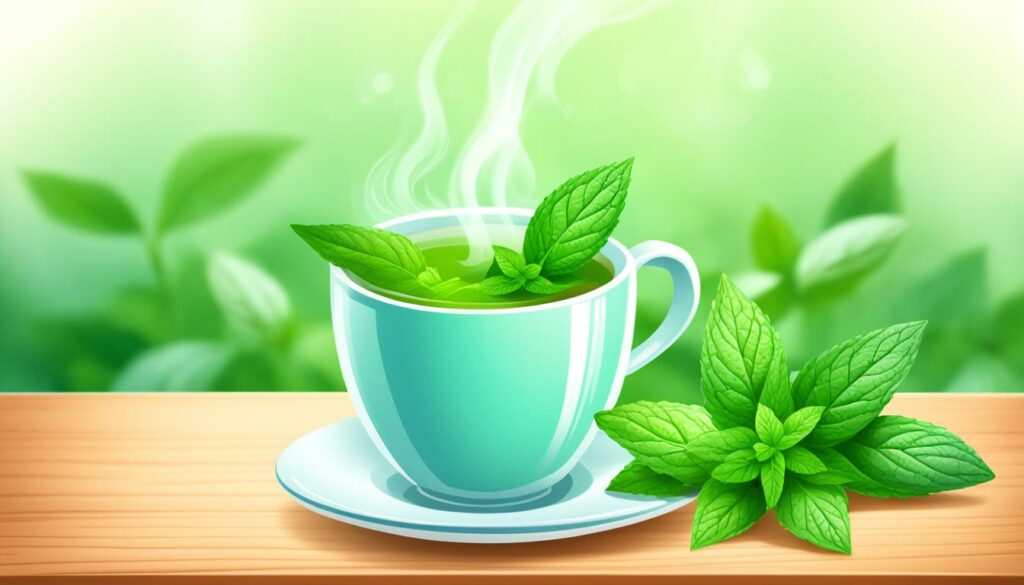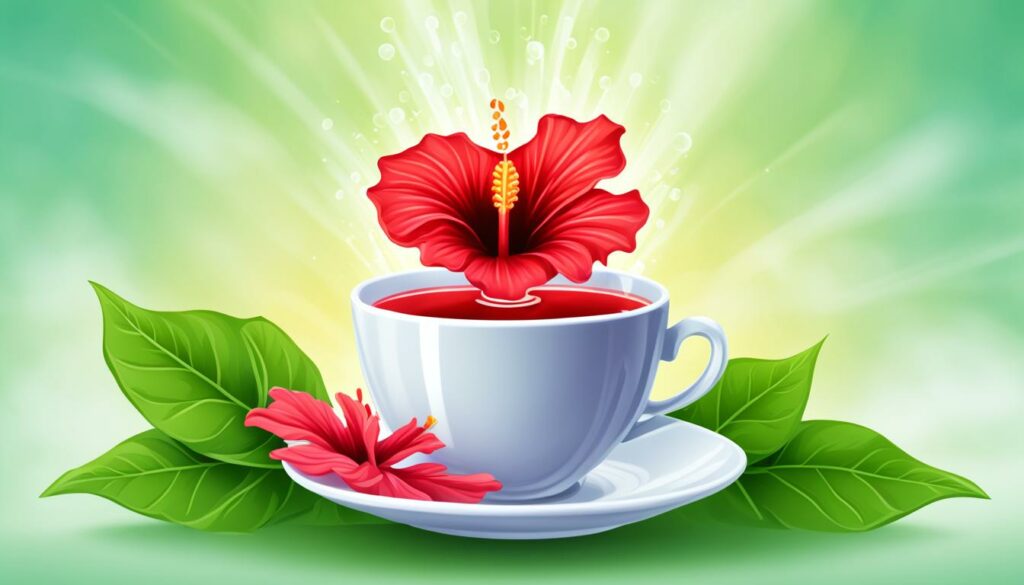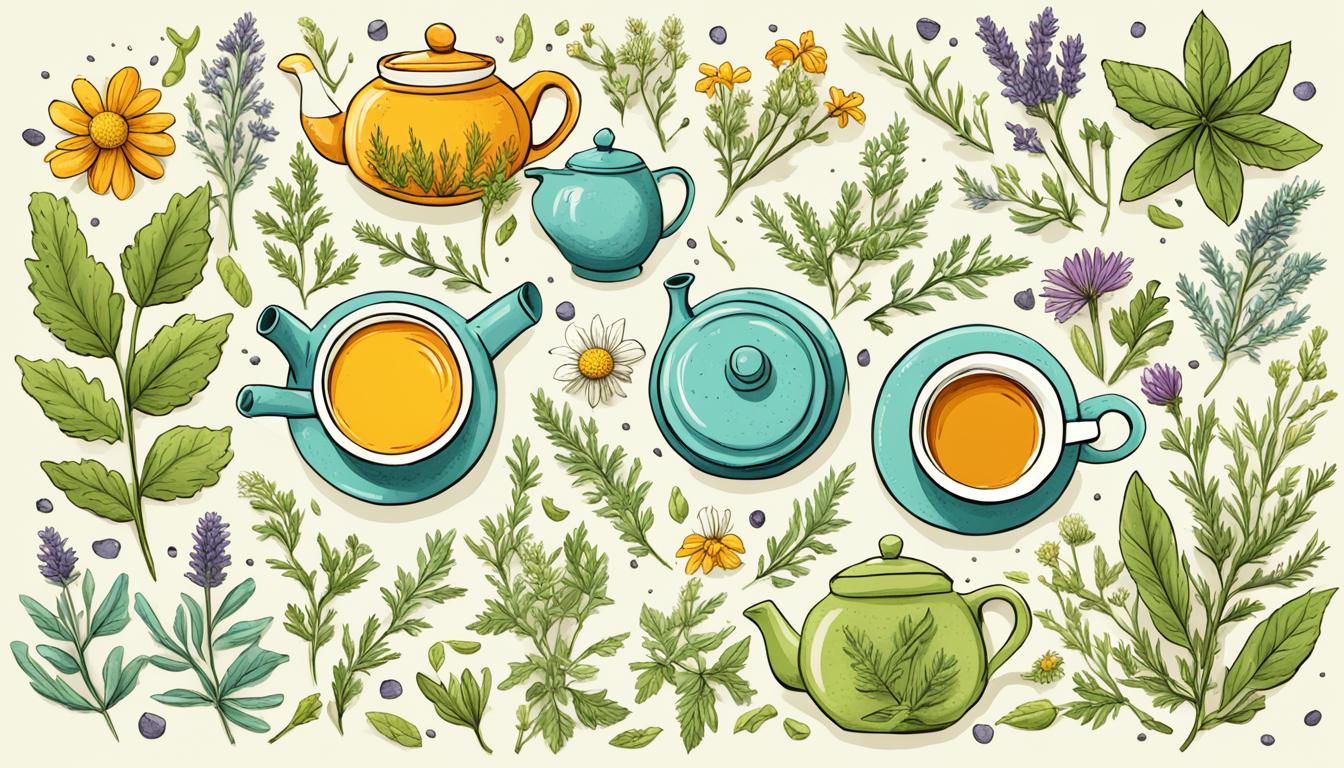Are you tired of relying on medication for your health issues? Have you ever wondered if there’s a natural remedy that can provide relief and comfort? Look no further than herbal teas! These incredible beverages, made from dried fruits, flowers, spices, or herbs, have been used for centuries to address various ailments and promote overall well-being.
But with so many herbal teas available, which ones should you try? Which ones are truly beneficial for your health? Don’t worry, we’ve got you covered.
In this article, we will explore the best herbal teas that offer a wide range of health benefits. From improving heart health to enhancing digestion and promoting better sleep, these herbal teas might just be the answer you’ve been looking for. So, get ready to sip your way to better health and comfort!
10 Healthy Herbal Teas to Try
Looking to explore the world of herbal teas? Here are 10 healthy and delicious options to add to your tea collection:
- Chamomile tea: Known for its calming effects, chamomile tea is perfect for relaxation. It can also improve sleep quality, help with blood sugar control, and ease symptoms of PMS.
- Peppermint tea: If you’re dealing with indigestion, nausea, or stomach pain, peppermint tea is your go-to remedy. Not only does it soothe the digestive system, but it also offers antioxidant, anticancer, antibacterial, and antiviral properties.
- Ginger tea: Packed with disease-fighting antioxidants, ginger tea is not only a popular remedy for nausea but can also prevent stomach ulcers, relieve indigestion, and improve blood sugar control.
- Hibiscus tea: Besides its vibrant color and refreshing taste, hibiscus tea may help reduce cholesterol, lower blood pressure, and decrease oxidative stress. But remember, if you’re on diuretic medication, consult your doctor before enjoying this tea.
- Echinacea tea: Commonly used to fight off the common cold, echinacea tea has immune-boosting properties that can help shorten the duration of illness and keep your immune system strong.
- Rooibos tea: Preliminary evidence suggests that rooibos tea may improve bone health, reduce the risk of heart disease, and lower blood pressure and cholesterol levels.
- Sage tea: Known for its medicinal properties, sage tea may have benefits for brain health, memory, and heart health. It also adds a unique, herbal flavor to your tea experience.
- Lemon balm tea: If you’re looking to boost your antioxidant levels while improving heart health, lemon balm tea is a great choice. It may also help reduce symptoms of depression and anxiety.
- Rose hip tea: Rich in vitamin C and anti-inflammatory properties, rose hip tea may reduce inflammation, pain associated with arthritis, and support weight management.
- Passionflower tea: Traditionally used to relieve anxiety and promote better sleep, passionflower tea is the ideal choice if you’re looking to relax and unwind.
With such a wide variety of flavors and health benefits, there’s a herbal tea for everyone. Explore these options and find your new favorite tea.
The Health Benefits of Chamomile Tea
Chamomile tea is well-known for its calming effects and is frequently used as a sleep aid. It offers a variety of health benefits that make it a popular choice for relaxation and promoting a sense of calm.
One of the key benefits of chamomile tea is its ability to improve sleep quality. It acts as a mild sedative, helping to reduce anxiety and promote a peaceful state of mind which is essential for a good night’s rest.
In addition to its sleep-inducing properties, chamomile tea has also been found to help with blood sugar control. Research suggests that regularly consuming chamomile tea can help regulate blood sugar levels, making it a potentially beneficial drink for individuals with diabetes or prediabetes.
Furthermore, chamomile tea has been traditionally used to support digestive health. It can help to soothe the digestive system, reduce inflammation in the gut, and relieve symptoms of conditions such as indigestion and irritable bowel syndrome (IBS).
For women, chamomile tea may also offer relief from symptoms of premenstrual syndrome (PMS). It has been shown to help alleviate menstrual cramps, mood swings, and physical discomfort associated with PMS, providing a natural and gentle way to find balance during that time of the month.
Chamomile tea is believed to have antibacterial and anti-inflammatory properties as well. These properties may help to protect the liver and support overall immune function, making chamomile tea a valuable addition to a healthy lifestyle.
Chamomile tea offers not only a soothing and relaxing experience but also a range of health benefits. Its calming effects make it a popular choice for relaxation and improved sleep quality. Whether enjoyed hot or iced, this herbal tea is a delightful and beneficial addition to any tea collection.
Health Benefits of Chamomile Tea
| Health Benefit | Description |
|---|---|
| Improved Sleep Quality | Chamomile tea acts as a mild sedative, promoting relaxation and better sleep. |
| Blood Sugar Control | Regular consumption of chamomile tea may help regulate blood sugar levels. |
| Digestive Health | Chamomile tea is known to soothe the digestive system and alleviate symptoms of indigestion and IBS. |
| PMS Relief | Chamomile tea can help reduce symptoms of premenstrual syndrome, including cramps and mood swings. |
| Antibacterial and Anti-inflammatory | Chamomile tea may have protective effects on the liver and support the immune system. |

The Digestive Benefits of Peppermint Tea
Peppermint tea is a refreshing and aromatic herbal tea known for its remarkable digestive benefits. This delightful beverage has been used for centuries to ease symptoms of indigestion, nausea, and stomach pain.
What sets peppermint tea apart is its unique combination of properties. It contains antioxidants that help protect the body from harmful free radicals, as well as compounds with anticancer, antibacterial, and antiviral effects.
One of the key benefits of peppermint tea is its ability to relax the intestinal tract, which can relieve bloating and reduce gas. Sipping on a warm cup of peppermint tea after a meal may help soothe digestive discomfort and support overall digestive health.
Studies have also shown that peppermint tea may be effective in relieving symptoms of irritable bowel syndrome (IBS), a digestive disorder that can cause abdominal pain, bloating, and changes in bowel habits.

It is important to note that while peppermint tea is generally safe for most individuals, those with acid reflux may want to exercise caution. Peppermint can relax the muscles that keep acid in the stomach, potentially worsening symptoms of acid reflux.
To enjoy the digestive benefits of peppermint tea, simply steep a peppermint tea bag or a handful of fresh peppermint leaves in hot water for about 5-10 minutes. You can sweeten it with honey or enjoy it as is.
The Immune-Boosting Properties of Ginger Tea
Ginger tea is a flavorful and invigorating herbal infusion with an array of health benefits. Packed with disease-fighting antioxidants, ginger tea can play a crucial role in boosting your immune system and promoting overall well-being.
One of the key benefits of ginger tea is its ability to relieve nausea. Whether caused by pregnancy, cancer treatments, or surgery, ginger tea is a well-known natural remedy for soothing an upset stomach. Its antiemetic properties can help alleviate queasiness and improve digestion.
But the benefits of ginger tea extend beyond relieving nausea. This herbal tea also has potential anti-inflammatory properties, making it a promising option for managing conditions associated with chronic inflammation. Additionally, ginger tea may help prevent stomach ulcers and relieve indigestion.
For women experiencing menstrual discomfort, ginger tea can provide much-needed relief. Its analgesic properties can help reduce pain and cramps associated with menstruation, allowing for a more comfortable experience each month.
Moreover, emerging studies suggest that ginger supplements, including ginger tea, may offer benefits for individuals with diabetes. Research indicates that ginger supplementation could improve blood sugar control and lipid levels, contributing to better overall management of diabetes.
When preparing ginger tea, you can experiment with various recipes to suit your taste preferences. Some common additions include lemon, honey, or even a hint of cinnamon. The warm and soothing aroma of ginger tea coupled with its health-boosting properties makes it a delightful beverage choice.
So, the next time you’re in need of an immune-boosting and refreshing drink, brew yourself a cup of ginger tea and enjoy the remarkable health benefits it offers.

Quick Facts about Ginger Tea:
- Ginger tea is rich in disease-fighting antioxidants.
- It is a natural remedy for nausea and digestive discomfort.
- Ginger tea may help prevent stomach ulcers and relieve indigestion.
- It can reduce pain associated with menstruation.
- Emerging studies suggest that ginger supplements may improve blood sugar control and lipid levels in people with diabetes.
The Heart-Healthy Effects of Hibiscus Tea
Hibiscus tea is not only delicious but also offers potential benefits for heart health. Studies have shown that regularly consuming hibiscus tea can have positive effects on blood pressure, cholesterol levels, and oxidative stress.

A study published in Medicine found that drinking hibiscus tea can significantly reduce both systolic and diastolic blood pressure. The tea contains natural compounds called anthocyanins, which are believed to help lower blood pressure by relaxing the blood vessels and improving blood flow.
Furthermore, research has shown that hibiscus tea has the ability to improve cholesterol levels. A review of multiple studies published in the Journal of Human Hypertension found that hibiscus tea consumption led to a reduction in total cholesterol and LDL cholesterol levels. These findings suggest that drinking hibiscus tea regularly may have long-term benefits in reducing the risk of heart disease.
In addition to its effects on blood pressure and cholesterol, hibiscus tea is also known for its antioxidant properties. The tea is rich in antioxidants that help protect the body against oxidative stress, which can contribute to the development of chronic diseases, including heart disease.
It is important to note that while hibiscus tea has many potential health benefits, individuals taking diuretics should exercise caution. Hibiscus tea may interact with certain medications, and it is advisable to consult a healthcare professional before adding it to your routine.
The Nutritional Profile of Hibiscus Tea
In addition to its heart-healthy effects, hibiscus tea is a good source of essential nutrients. Here is the nutritional profile of hibiscus tea per 8-ounce serving:
| Nutrient | Amount |
|---|---|
| Calories | 0 |
| Protein | 0g |
| Carbohydrates | 0g |
| Fat | 0g |
| Fiber | 0g |
| Vitamin C | 20% of the Recommended Dietary Allowance (RDA) |
| Calcium | 2% of the RDA |
| Iron | 2% of the RDA |
The fact that hibiscus tea is calorie-free makes it an excellent beverage choice for those watching their calorie intake. Additionally, the significant amount of vitamin C found in hibiscus tea can provide immune support and contribute to overall well-being.
With its delightful flavor and numerous health benefits, hibiscus tea is a great addition to any herbal tea collection. Whether you enjoy it hot or cold, this vibrant and refreshing tea can help keep your heart healthy and your taste buds satisfied.
The Sleep-Inducing Power of Chamomile Tea
When it comes to a good night’s sleep, chamomile tea is often the go-to choice. This herbal infusion has been valued for centuries for its ability to promote relaxation and soothe the mind and body. What makes chamomile tea so effective for sleep? It all lies in its natural compound called apigenin.
Apigenin, found in chamomile flowers, attaches to receptors in the brain, reducing anxiety and creating a calm state of mind. This mild tranquilizing effect aids in improving sleep quality and can be particularly beneficial for those who struggle with insomnia or have difficulty unwinding at the end of the day.
Whether you’re dealing with stress, restlessness, or simply looking to have a more restful sleep, chamomile tea can be a comforting and natural solution. Its gentle properties make it a popular herbal tea choice for those seeking a bedtime routine that promotes relaxation and peaceful sleep.

